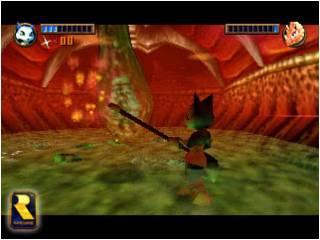Overview
During a game's development cycle, it is sometimes the case that the decision is made mid-way through the project to halt the game's development on the current platform and switch to a new target. Sometimes, this is done due to the fact that the game's current development cycle is slated to extend beyond the launch of the next generation of hardware; thus, it would make more sense to develop the game for the next console. At other times, a game is cancelled during development on one platform only to be resurrected years later on a different platform. Reasons for such decisions vary for a a number of reasons, including but not limited to the decision to focus development on other projects or a change in studio ownership that results in shifting priorities.
Examples
Star Fox Adventures
 Gameplay from the N64 development of Dinosaur Planet.
Gameplay from the N64 development of Dinosaur Planet.Originally, the GameCube title Star Fox Adventures wasn't a Star Fox title at all. When Rare began work on the game as a Nintendo 64 title, it was a much different game entitled Dinosaur Planet. However, at Shigeru Miyamoto's behest, plans for the game were changed in order to fit it into the Star Fox universe. While elements of the original game remained in terms of its basic story outline and gameplay, Fox McCloud was inserted as the main protagonist and the game's story was rewritten to take him and the other Star Fox characters into account. Krystal, originally an anthropomorphic feline and player character in Dinosaur Planet, had her role reduced, and she was redesigned as an anthropomorphic vixen in order to be a match for Fox. While these changes and others were made, the decision was also made to move development to the Nintendo GameCube. The game was eventually released as Rare's last title as a Nintendo development studio.
Perfect Dark Zero/Kameo: Elements of Power
Both Perfect Dark Zero and Kameo: Elements of Power began development while Rare was still a Nintendo-owned development studio. The games were both intended for release on the GameCube, but after Rare parted ways with Nintendo following the release of Star Fox Adventures, they were immediately bought by Microsoft to develop games for their Xbox console. Neither title was released on the original Xbox; rather, both were delayed until the release of the Xbox 360.
Too Human/Eternal Darkness
Years before its appearance on the Xbox 360, Too Human originally began development at Silicon Knights as a title for the original PlayStation in 1999. After becoming a Nintendo second-party developer, Silicon Knights briefly moved development to Nintendo hardware, but it was eventually shelved in order to focus on the development of Eternal Darkness: Sanity's Requiem. Like Star Fox Adventures, Eternal Darkness was originally conceived as a Nintendo 64 title, but development was shifted to the GameCube, on which it was eventually released. Following the completion of Eternal Darkness, Too Human remained on the back-burner while Silicon Knights developed Metal Gear Solid: The Twin Snakes as part of a special partnership between Nintendo and Konami.
After severing ties with Nintendo, Silicon Knights signed on with Microsoft and restarted development of Too Human. By this point, the game had become quite different than its original concept. The 360 version of Too Human features a mixture of science fiction and Norse mythology that was not in the original concepts presented at the 1999 Electronic Entertainment Expo. This new version of Too Human was also stated by Silicon Knights to be the first chapter in a planned trilogy of games. However, the game was not well received by critics, and its poor sales forced Silicon Knights to abandon the idea of a trilogy. The game was later removed from store shelves by court order after it was determined that the game contained unauthorized Unreal Engine 3 code.
Mother 3
The development of Mother 3 extended across a total of three platforms. Development on the game originally began on the Super Famicom after the release of EarthBound. However, development eventually shifted to the Nintendo 64, where it was to feature polygonal graphics and make use of the Nintendo 64DD; a disk-drive accessory that was ultimately only released in Japan and supported by a scant few titles. With the failure of the 64DD, development was eventually moved again, this time to the Game Boy Advance, on which it was eventually released.
Log in to comment